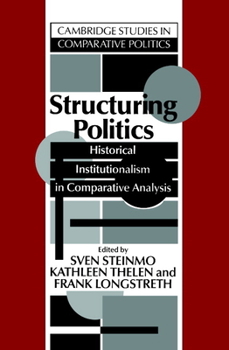Structuring Politics: Historical Institutionalism in Comparative Analysis
(Part of the Cambridge Studies in Comparative Politics Series)
Select Format
Select Condition 
Book Overview
This volume brings together original essays by scholars working on a diverse range of empirical issues, but whose work is in each case informed by a historical institutional approach to the study of politics. By bringing these pieces together, the volume highlights the methodological and theoretical foundations of this approach and illustrates the general contributions it has made to comparative politics. The essays demonstrate the potential of the...
Format:Paperback
Language:English
ISBN:0521428300
ISBN13:9780521428309
Release Date:September 1992
Publisher:Cambridge University Press
Length:272 Pages
Weight:0.92 lbs.
Dimensions:0.7" x 6.2" x 9.1"
Customer Reviews
1 rating
Examining Historical Institutionalism
Published by Thriftbooks.com User , 17 years ago
Thelen, Longstreth, and Steinmo examine the new institutional paradigm, particularly historical institutionalism. In order to understand new institutionalism, it is necessary to examine its origin. The formal-legal model is the old institutionalism and concentrated on the formal "administrative, legal, and political structures." It was normative in style and offered little in the way of comparative analysis; they failed to look at intermediate level variables. The old institutionalism was replaced by the behavioralist paradigm. Behavioralists concentrated on "characteristics, attitudes, and behaviors of the individuals and groups themselves" to explain political outcomes. They sought broad explanatory theories, but failed to examine the institutional "playing field" on which the actors interact. From here, the new institutionalists "narrowed down" many of the broad theories posed by the behavioralists. They began to look at the intermediate institutions which define "constellations of incentives and constraints faced by political actors in different national contexts." The new institutionalism bridges the gap between the theories of formal-legalism (narrow) and behavioralism (broad). Thelen, Longstreth, and Steinmo discuss both rational choice institutionalism (RCI) and historical institutionalism (HI), but find the historical model more helpful. Both rational choice and historical institutionalism argue that "institutions shape political strategies and influence political outcomes" but differ in many regards. Rational choice assumes actors' preferences are based on individual utility maximization. Institutions shape the strategies used for utility maximization. The historical institutional model argues that choices are not always made based on utility maximization, but on satisficing; "most of us, most of the time, follow socially defined rules, even when doing so may not be directly in our self-interest." Historical institutionalism contends that historical policy or previous governmental decisions, and the institutional structures that emerge out of these decisions may determine the subsequent decisions made. The process is path dependent. Additionally, there is a social or cultural element that shapes the goals and strategies of individuals. People often resort to traditional structures, even when doing so may not be in the best interest. As such, if we want to explain choices and strategies, we must look at the context within which these choices are made. The major difference between the RCI and the HI is that HI looks at both strategies AND goals. Differences between RCI and HI include the inductive versus deductive methodology of the models. RCI deduces its hypotheses from a broad, global assumption and is developed prior to analysis, while HI looks at more specific cases and essentially traces institutional development backwards from the case. The benefits of historical institutionalism include its ability to e






